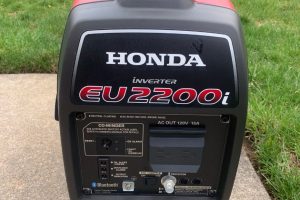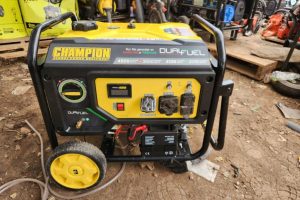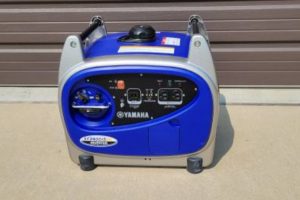Top Portable Gas Generators for RV Camping This Fall
Now that you have a solid understanding of the types of portable gas generators and the key features to consider, it’s time to explore some of the best options available on the market. We’ve scoured the offerings and compiled a list of top-rated generators to help you power up your RV adventures. For each generator, we’ll provide specifications, highlight their pros and cons, and mention any unique features that make them particularly suitable for RV use.
1. Honda EU2200i – Best Inverter Generator

Specifications:
- Type: Inverter
- Fuel Type: Gasoline
- Power Output: 2200 watts
- Noise Level: 48-57 dB
- Weight: 46.5 pounds
Pros:
- Exceptionally quiet operation.
- Clean power output suitable for sensitive electronics.
- Fuel-efficient, with up to 8.1 hours of runtime at 25% load.
- Compact and lightweight design for easy transport and storage.
- Parallel capability for increased power output when needed.
Cons:
- Slightly more expensive than some competitors.
Unique Feature: The Honda EU2200i is renowned for its whisper-quiet operation, making it perfect for campers who value peace and quiet during their trips.
2. Champion 3800-Watt Dual Fuel Generator – Best for Versatility

Specifications:
- Type: Conventional (Dual Fuel)
- Fuel Type: Gasoline or Propane
- Power Output: 3800 watts (4750 starting watts)
- Noise Level: 68 dB
- Weight: 122 pounds
Pros:
- Dual-fuel capability for flexibility in choosing your fuel source.
- Powerful enough to run essential RV appliances.
- Electric start for convenience.
- RV-ready with a 30-amp RV outlet.
- 9-hour runtime on gasoline at 50% load.
Cons:
- Heavier and noisier compared to inverter generators.
Unique Feature: The Champion 3800-Watt Dual Fuel Generator offers the convenience of choosing between gasoline and propane, ensuring you can find fuel wherever your adventures take you.
3. Yamaha EF2400iSHC – Best for High Power Needs

Specifications:
- Type: Inverter
- Fuel Type: Gasoline
- Power Output: 2400 watts (2800 starting watts)
- Noise Level: 53-60 dB
- Weight: 75 pounds
Pros:
- High surge wattage to start and run power-hungry appliances.
- Clean, stable power output.
- Smart Throttle feature adjusts engine speed for fuel efficiency.
- Extended runtime of up to 8.6 hours at 25% load.
- Parallel-ready for additional power.
Cons:
- Relatively higher noise level compared to some inverter generators.
Unique Feature: The Yamaha EF2400iSHC’s ability to handle high surge wattage makes it an excellent choice for RVers with demanding power needs, such as air conditioning units.
Maintenance Tips
To ensure the longevity of your portable generator and its reliable performance during your RV adventures, here are some essential maintenance tips:
- Regular Oil Changes: Follow the manufacturer’s recommendations for oil changes to keep the engine running smoothly.
- Proper Fuel Storage: Use fresh fuel and add a fuel stabilizer if storing the generator for an extended period.
- Cleaning: Keep the generator clean by removing dirt, debris, and dust from its exterior and vents.
Safety Precautions
Safety should be a top priority when using portable generators in your RV. Here are some crucial safety measures to follow:
- Proper Ventilation: Always operate your generator in a well-ventilated area to prevent the buildup of carbon monoxide.
- Carbon Monoxide Detection: Install carbon monoxide detectors in your RV to alert you to any dangerous gas levels.
Choosing the Right Generator for Your RV
In summary, choosing the right generator for your RV camping adventures involves considering factors like fuel type, power output, noise level, size, and runtime. Assess your specific needs and preferences and match them to the features offered by the generator models you’re considering. Whether you prioritize quiet operation, high power output, or versatility, there’s a generator out there to meet your requirements.
1. Fuel Type: Meeting Your Energy Demands Efficiently
The first crucial decision in your generator quest is the choice of fuel type. Gasoline, propane, and dual-fuel options are common, each with its own set of advantages.
- Gasoline Generators: These are widely available and more budget-friendly, but bear in mind their limited shelf life and potential noise and fuel-efficiency trade-offs.
- Propane Generators: Opt for propane if clean-burning fuel and longer shelf life are priorities. Though slightly lower in power output than gasoline, propane’s benefits might outweigh this consideration.
- Dual-Fuel Generators: Combining the flexibility of both gasoline and propane, dual-fuel generators offer a best-of-both-worlds solution. However, this convenience often comes at a higher upfront cost.
2. Power Output: Matching Your RV’s Energy Appetite
Understanding the power requirements of your RV appliances is paramount. Create a comprehensive list of devices you plan to operate simultaneously and their respective wattage ratings. This will guide you in selecting a generator with sufficient power output to meet your RV’s energy demands without overloading the system.
3. Noise Level: Embracing Serenity on the Road
For many RV enthusiasts, the joy of camping lies in the tranquil embrace of nature. A noisy generator can disrupt this peace. If serene surroundings are a priority, lean towards generators with lower decibel levels. Inverter generators, in particular, are known for their quiet operation, making them an excellent choice for noise-sensitive environments.
4. Size and Portability: Embracing Mobility and Convenience
RV life is synonymous with mobility, and your generator should seamlessly fit into this lifestyle. Consider the physical dimensions and weight of the generator to ensure it’s easy to transport and fits comfortably in your RV storage compartment. A compact and lightweight design adds to the overall convenience of your RV setup.
5. Runtime and Fuel Efficiency: Sustaining Your Adventures
A generator’s runtime and fuel efficiency play pivotal roles in the convenience of your camping experience. Nobody wants to interrupt their outdoor activities for frequent refueling. Inverter generators are often praised for their fuel efficiency, providing extended runtimes at varying loads.
6. Clean Power Output: Safeguarding Your Sensitive Electronics
If you plan to run sensitive electronics such as laptops, smartphones, or medical devices in your RV, prioritize generators that offer clean power output. Inverter generators excel in this regard, delivering stable power that won’t harm your delicate devices.
Find the Right RV Rental with Generator Options at RVnGO
When embarking on your RV adventure, finding the perfect RV rental equipped with the right generator is crucial for a seamless and comfortable journey. Look no further than RVnGO, your go-to platform for discovering the ideal RV rental with generator options.
Hosts on RVnGO provide renters with a diverse selection of recreational vehicles, ensuring you find one tailored to your specific needs and preferences. Whether you prioritize quiet inverter generators for serene camping or need a robust conventional generator for high power demands, hosts on RV may provide a range of options to enhance your travel experience.
With user-friendly search filters and a comprehensive listing of RVs with various generator types, RVnGO simplifies the process of finding the right rental for your next adventure. Don’t just rent an RV; choose the perfect home on wheels with the power to match, courtesy of RVnGO.
